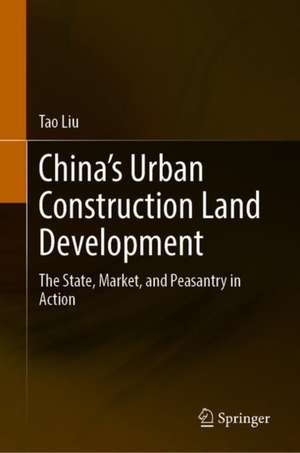China’s Urban Construction Land Development: The State, Market, and Peasantry in Action
Autor Tao Liuen Limba Engleză Hardback – 28 oct 2019
This book examines the nature and internal dynamics of China’s urban construction land (UCL) development, drawing insights from the recently developed theory of regional political ecology. Based on the author’s original research, it identifies two different types of UCL development in China, namely top-down, formal development in the legal and regulated domain, and spontaneous and informal, bottom-up development in the semi-legal, poorly regulated gray domain. Presenting a systematic analysis and comparison, it reveals a scale and speed of informal land development no less significant than that of formal land development, although informal land development tends to be scattered, pervasive, difficult to track, and largely overlooked in research and policy formation. Contrary to the popular perception of the peasantry as passive victims of land development, this book uncovers an intriguing dynamic in which the peasantry has played an increasingly (pro)active role in developing theirrural land for urban uses in informal markets.
Further, based on an investigation of UCL development in Beijing and Shenzhen, it shows an interesting trajectory in which the uneven growth and utilization of UCL are contingent upon the various developmental milieus in different places. China’s land institutions, based on an urban–rural dual land system, are not conducive to the ultimate goal of saving and efficiently utilizing land. Accordingly, an urban–rural integrated land market and management system is highly advisable.
The theoretical and empirical enquiry presented challenges the perceived notion of China’s UCL development as the outcome of market demand and state supply. Further, it argues for an inclusive treatment of the informality that has characterized urbanization in many developing countries, and for a reassessment of the role played by the peasantry in land-based urbanization.
| Toate formatele și edițiile | Preț | Express |
|---|---|---|
| Paperback (1) | 948.93 lei 6-8 săpt. | |
| Springer Nature Singapore – 28 oct 2020 | 948.93 lei 6-8 săpt. | |
| Hardback (1) | 960.42 lei 6-8 săpt. | |
| Springer Nature Singapore – 28 oct 2019 | 960.42 lei 6-8 săpt. |
Preț: 960.42 lei
Preț vechi: 1171.25 lei
-18% Nou
Puncte Express: 1441
Preț estimativ în valută:
183.78€ • 200.25$ • 154.86£
183.78€ • 200.25$ • 154.86£
Carte tipărită la comandă
Livrare economică 23 aprilie-07 mai
Preluare comenzi: 021 569.72.76
Specificații
ISBN-13: 9789811505645
ISBN-10: 9811505640
Ilustrații: XXVII, 474 p. 169 illus., 19 illus. in color.
Dimensiuni: 155 x 235 mm
Greutate: 0.88 kg
Ediția:1st ed. 2020
Editura: Springer Nature Singapore
Colecția Springer
Locul publicării:Singapore, Singapore
ISBN-10: 9811505640
Ilustrații: XXVII, 474 p. 169 illus., 19 illus. in color.
Dimensiuni: 155 x 235 mm
Greutate: 0.88 kg
Ediția:1st ed. 2020
Editura: Springer Nature Singapore
Colecția Springer
Locul publicării:Singapore, Singapore
Cuprins
Introduction.- Interpreting the Development of Urban Construction Land in China.- Understanding Land Developments in a Globalizing World: Theoretical Alternatives.- Making Sense of China’s Urban Construction Land Development: Towards Dual-track Political Ecology.- Methodological Issues.- The Changing Geography of China’s Urban Construction Land.- Changing Institutions for The Development of Urban Construction Land.- Formal Development of China’s Urban Construction Land.- Informal Development of China’s Urban Construction Land. Urban Construction Land Development in Beijing.- Urban Construction Land Development in Shenzhen.- Conclusion.
Notă biografică
Tao Liu joined the College of Urban and Environmental Sciences at Peking University (China) from The University of Hong Kong, where he received a Ph.D. in Geography. Before that, he earned a master’s degree in Human Geography and bachelor’s degrees in Urban Planning and Economics from Peking University, China. His main research focus is urbanization, migration, urban land development, and urban and rural planning. Dr. Liu has published 2 books and more than 60 research articles in respected national and international journals. He has accumulated extensive experience from various urban consulting projects.
Textul de pe ultima copertă
This book examines the nature and internal dynamics of China’s urban construction land (UCL) development, drawing insights from the recently developed theory of regional political ecology. Based on the author’s original research, it identifies two different types of UCL development in China, namely top-down, formal development in the legal and regulated domain, and spontaneous and informal, bottom-up development in the semi-legal, poorly regulated gray domain. Presenting a systematic analysis and comparison, it reveals a scale and speed of informal land development no less significant than that of formal land development, although informal land development tends to be scattered, pervasive, difficult to track, and largely overlooked in research and policy formation. Contrary to the popular perception of the peasantry as passive victims of land development, this book uncovers an intriguing dynamic in which the peasantry has played an increasingly (pro)active role in developing theirrural land for urban uses in informal markets.
Further, based on an investigation of UCL development in Beijing and Shenzhen, it shows an interesting trajectory in which the uneven growth and utilization of UCL are contingent upon the various developmental milieus in different places. China’s land institutions, based on an urban–rural dual land system, are not conducive to the ultimate goal of saving and efficiently utilizing land. Accordingly, an urban–rural integrated land market and management system is highly advisable.
The theoretical and empirical enquiry presented challenges the perceived notion of China’s UCL development as the outcome of market demand and state supply. Further, it argues for an inclusive treatment of the informality that has characterized urbanization in many developing countries, and for a reassessment of the role played by the peasantry in land-based urbanization.
Caracteristici
Situates urban land development in the pluralistic model of Chinese urbanization and broader political economic processes Develops a dual-track political ecology framework to examine state–peasantry interactions in formal and informal processes of land development Demonstrates the quantitative and functional importance of informality in facilitating urbanization in developing economies Compares the processes and efficiency of urban land development in Beijing and Shenzhen
